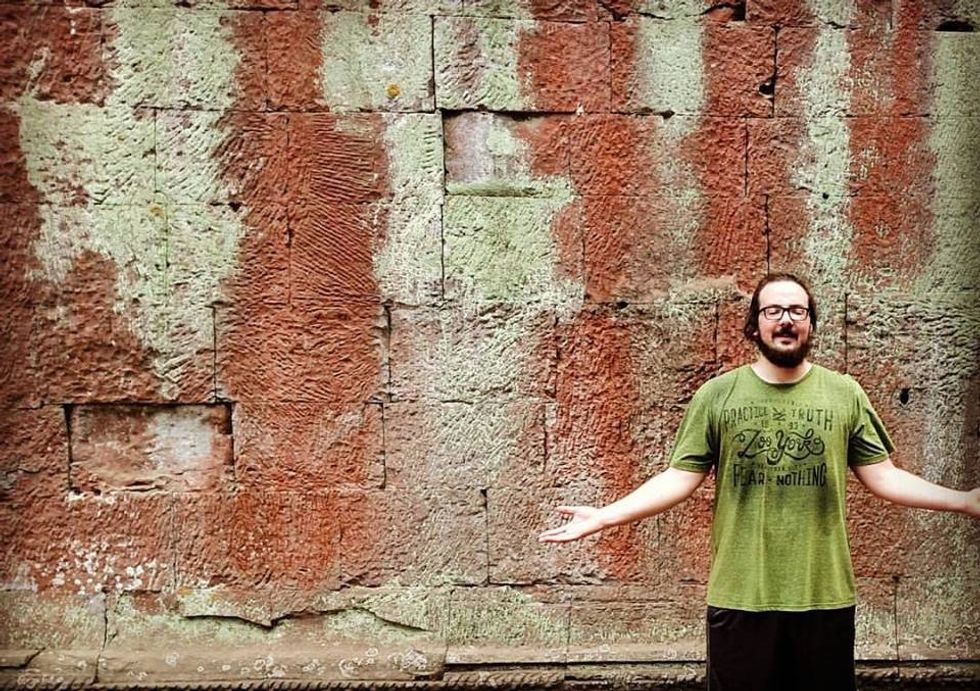When our cross-cultural group visited International Justice Mission’s Phnom Penh office, the American transplant who talked us through the NGO’s operation in Cambodia said that IJM’s work to combat sex trafficking was, for the most part, finished. After countless raids on child prostitution rings, the non-profit was moving on to countries where the situation was more dire, and redirecting their in country efforts to combating labor trafficking. The horrors detailed in Terrify No More, President Gary Haugen’s account of the non-profit's work in Cambodia, were, by and large, a thing of the past. But, the fact that I was offered a child prostitute on my first night in the Cambodian capital led me to doubt that premise.
That was the final eye-opening moment in a day that was filled with them. In the morning, I saw a Khmer woman, pants pulled down in a crowded area, urinating on a public sidewalk. My friends and I, sidestepped her stream; our native guide didn’t blink. I saw disabled beggars—usually with a limp or a limb-missing—hawking books from a plastic basket they wore around their necks to mostly uninterested tourists.
Later on in the three-week trip, I saw a man, begging in an outdoor shopping center, whose face was obscured by a giant growth, the size and shape of a swaddled infant, that hung from the crown of his head like a giant, brown uvula. The hair from the top of his head followed it down about halfway, thinning as it went. The bottom was bald and bulging. (The man’s name is Vid. The Daily Mail ran an article last year about a vacationing Australian couple’s mission to help him get the necessary surgery. Vid was game: “He said maybe the girls might be interested in him if the growth is removed.”)
All that to say, getting approached by a pimp wasn’t the only shocking thing that happened during the trip, but it certainly affected me in a way that nothing else did.
Dr. Chia and Professor Norwood, the teachers leading the two sections of the trip, ordered a variety of traditional Khmer foods for us during our first dinner out in the city. While we waited—and it felt like the wait stretched on forever—my friend Chad and I left the restaurant to walk around the block. On our right, a toddler in a diaper played in a pile of trash on the roadside. The couple that we assumed were his parents smoked nearby.
Almost immediately, a moped pulled up alongside us. The small Khmai man behind the handlebars smiled at me, his lips tight over big, Chiclet white teeth.
“You want boom boom?”
“No thanks,” I replied. I knew the term from Haugen’s book.
His smile widened to lip-cracking proportions. The hammer of his pitch was about to drop.
"VERY young girl."
"No thanks. Not today," I replied, giving the same line to a man offering to sell me a child as I would to a cashier asking if I wanted to donate to one.
I put my hand on his shoulder.
"Have a good night though. God bless."
He and his smile rode gently into the night. The nice pimp had spoken softly, and Chad, on the other side of the sidewalk, had missed most of the conversation.
Chad: "What did he ask you?"
Me: "He was trying to sell me a child prostitute."
Chad: "Probably only came up to you 'cause you're white."
As we walked back I thought about the truth of that, and the fact that renting out a woman for a week in the country costs only two hundred American dollars. I thought about the casual evil of "VERY young girl" as "But wait there's more!" And I thought about how incredibly polite a response, "Not today," is to the offer of sex with a child.
I shook a little for the rest of dinner.
Cambodia’s present only looks bright when compared with the darkness of its past. Early on, we went to S-21, a high school that became a concentration camp in the 1970s under the Khmer Rouge. The guide, who told the story of S-21 with an aggressive, hard edge to his words, told us about prisoners being denied access to the restroom, and being forced to eat their mess if they couldn’t hold it. Women had their nipples ripped off as torture. Victims were flogged repeatedly with live wires, and, if they passed out from the pain, their unconscious heads were dunked in buckets of manure water to revive them.
S-21 was just the prison. Choeung Ek was death row. Millions of Khmer men, women, and children were shipped out, either to Choeung Ek, or to another killing field like it; slaughtered en masse, buried in mass graves. We stood on the dusty ground where it happened; our guide pointed out the spots where the victims’ clothing— frayed pieces of faded yellow and red fabric— was visible above the ground. “Very sad,” he repeated over and over.
And, during the second week, we traveled to Svay Pak, the village at the center of Terrify No More, and at the heart of IJM’s efforts to stop child sex trafficking. For decades it was infamous, an oasis for Western pedophiles who, during business trips to southeast Asia, would travel to the village, and select their prostitute from a lineup of underage girls. As my encounter with the pimp taught me, the younger the better. Poor parents—and, in Cambodia, poor means living near a mountain of garbage so that you can scavenge for food when the dump truck comes— saw this as the only option.
Svay Pak today is largely transformed. The brothels have been shut down; IJM carrying with them the weight of American influence, put the screws to the Cambodian government and the Cambodian government complied. Another non-profit—and Cambodia is often referred to as the “non-profit capital of the world—Agape has taken over the old buildings, helping trafficked girls transition out of slavery and into a normal life. They have also started a garment factory, where men, women, and children can find honest, good paying work, in an effort to help the village economy transition away from its dependence on sex trafficking.
In one of the transformed buildings, Agape has left one room as it was. It looks the same as it did years ago when child prostitutes led johns back to it nightly. The walls are gray and dirty, and the bed is a small wooden cot.
All of this was very affecting, but it didn’t affect me.
We approached all of these moments with the solemnity they deserved, but I felt the way I often felt in church as a kid. The more I heard about Jesus’s suffering on the cross—the more vivid the spear, the nails, the thorns— the more I shrugged. I tried, repeatedly, pushing the jagged edge of the brittle communion cracker into the roof of my mouth, hoping that the small amount of pain would inspire some empathy. It didn’t.
There was one moment on the trip that made me feel something.
"VERY young girl."
“No thanks. Not today.”




















